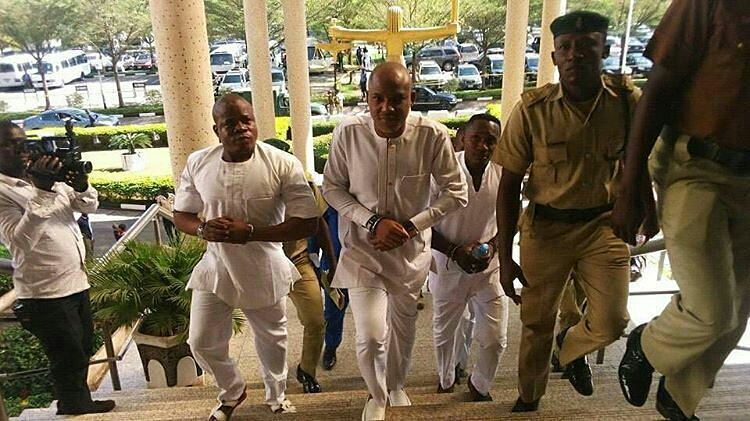A Nigerian court has denied a bail request for separatist leader Nnamdi Kanu who is standing trial for “terrorism” charges and broadcasting falsehoods, one of his defence lawyers told Reuters.
The court session was held on Wednesday on camera, according to new regulations for trials with charges of terrorism.
An attempt by Igbo separatists to secede as the Republic of Biafra in 1967 triggered a three-year civil war.
Kanu, a British citizen who leads the banned Indigenous People of Biafra (IPOB), is standing trial on seven counts of terrorism that the government has brought against him.
He has denied the charges, which are also linked to broadcasts he made between 2018 and last year.
READ ALSO: Biden approves redeployment of U.S. troops to Somalia
IPOB, which Kanu founded in 2014, is pressing for the secession of a part of southeast Nigeria where the majority of the population is of Igbo ethnicity. Authorities view IPOB as a terrorist group.
An attempt by Igbo separatists to secede as the Republic of Biafra in 1967 – the year that Kanu was born – triggered a three-year civil war that killed more than one million people.
IPOB has ordered Igbos in the southeast to “sit-at-home”, a form of civil disobedience to show solidarity with Kanu since his arrest and trials in Abuja, crippling small businesses, and other economic activities.
According to a report, the Nigerian court on Wednesday denied a bail request for separatist leader Nnamdi Kanu, who is standing trial on terrorism charges and for broadcasting falsehoods, one of his defence lawyers said.
A judge said Kanu has to account for his whereabout following previous bail and refusal to attend court hearing, the lawyer told Reuters.
Kanu, a British citizen who leads the banned Indigenous People of Biafra (IPOB), disappeared from Nigeria after skipping bail in 2017. He was arrested after years on the run.
IPOB, which Kanu founded in 2014, is pressing for the secession of a part of southeast Nigeria where the majority of the population belongs to the Igbo ethnic group. Authorities view IPOB as a terrorist group. IPOB says it wants to acheive independence through non-violent means.
An attempt by Igbo separatists to secede as the Republic of Biafra in 1967 – the year that Kanu was born – triggered a three-year civil war that killed more than 1 million people.
IPOB has ordered Igbos in the southeast to “sit-at-home”, a form of civil disobedience to show solidarity with Kanu since his arrest and trials in Abuja, crippling small businesses, and other economic activities.
Prior to Wednesday’s ruling, police fired tear gas to disperse IPOB members or supporters crowding on a highway leading to the court, a Reuters reporter said.
Kanu is standing trial on seven counts of terrorism which the government has brought against him. Kanu has denied the charges, which are also linked to broadcasts he made between 2018 and last year.
His lead lawyer in April said Kanu cannot be tried on terrorism charges because he was not extradited to Nigeria based on those charges.













